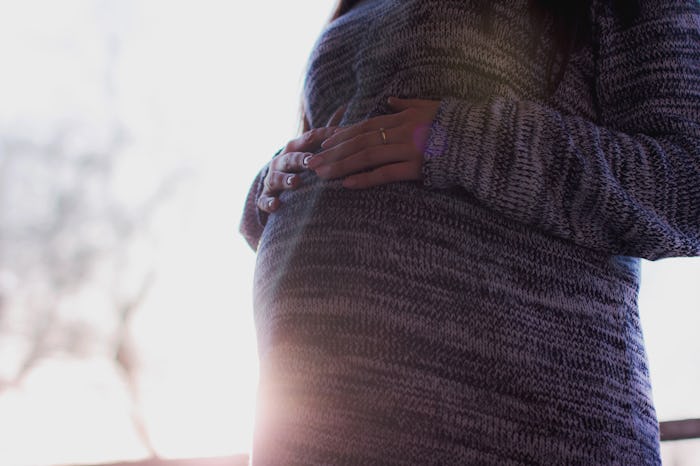Life
Can You Be Fired For Hiding A Pregnancy? Expectant Moms Have Workplace Protections
Republican presidential candidate Donald Trump thinks pregnancy is "wonderful" — unless you're a boss whose whose employee is about to pop out a baby. The real estate mogul is facing criticism for his 2004 assertion that pregnancy is "an inconvenience for a business," a position that, coming from a businessman, can limit women's autonomy and mobility at work, and even drive them to conceal the fact that they're expecting for fear of repercussions. Years ago, one Trump employee did just that to avoid professional fallout — even though that type of discrimination in illegal under federal law. A woman would definitely have the ammunition for a lawsuit if she were let go from her position for being pregnant, but can you be fired for hiding a pregnancy?
Appearing on NBC's Dateline a dozen years ago, Trump made his position on pregnant working women clear. "Well, you know, pregnancy is never ... it's a wonderful thing for the woman, it's a wonderful thing for the husband, it's certainly an inconvenience for a business," he said. "And whether people want to say that or not, the fact is it is an inconvenience for a person that is running a business."
And, in business, when something is perceived as an inconvenience or setback, it's usually eliminated. To protect people from falling victim to this attitude, the Pregnancy Discrimination Act of 1978 made it illegal to treat pregnant women as disposable or otherwise less-than-valuable at their jobs, as long as the company employs at least 15 people.
According to CNN, this law stipulates that a woman cannot be fired because she's pregnant, even if the employers claims to be concerned about her safety. They can't refuse to hire a pregnant woman because she is pregnant. It's also a major legal no-no to force a pregnant woman — one who's still capable of doing the job she was hired to do — to take time off or change jobs.
Still, then-Trump Golf Properties Executive Vice President Carolyn Kepcher said on Dateline in 2004 that she decided not to tell her boss, Donald Trump, that she was pregnant until she was six months along. "Maybe in my mind he might think this would perhaps be a setback or 'maybe I'm going to have to bring somebody in to replace her throughout her pregnancy or when she takes maternity leave,'" she said at the time. "If I tell him at six months, it will be over in three months."
Legally, though, Trump could not have attempted to take any adverse action against Kepcher. But that doesn't make determining when to inform a boss about a pregnancy any less treacherous. Although they can't legally fire pregnant women who are upfront about their conditions, the situation becomes much more complicated if the boss finds out about the pregnancy through office gossip, for example, rather than from the employee herself.
According to New York Magazine, if a boss finds out about a pregnancy through these "unofficial channels" — a coworker who tells a coworker who tells a coworker in charge — he or she can fire the worker, likely without legal repercussions. That's because if would be incredibly difficult to prove pregnancy discrimination if the boss was never formally told about the pregnancy. And that negates the good work PDA set out to do.
So, if Trump had caught a whiff of Kepcher's secret pregnancy, he could have fired her scot-free. What he could not have done is fire her once she did tell him, even though she waited until she was nearly ready to give birth to do so.
Whatever the case, it's probably safe for women to just be upfront about their pregnancies right away — legally, they'll at least be somewhat protected.
